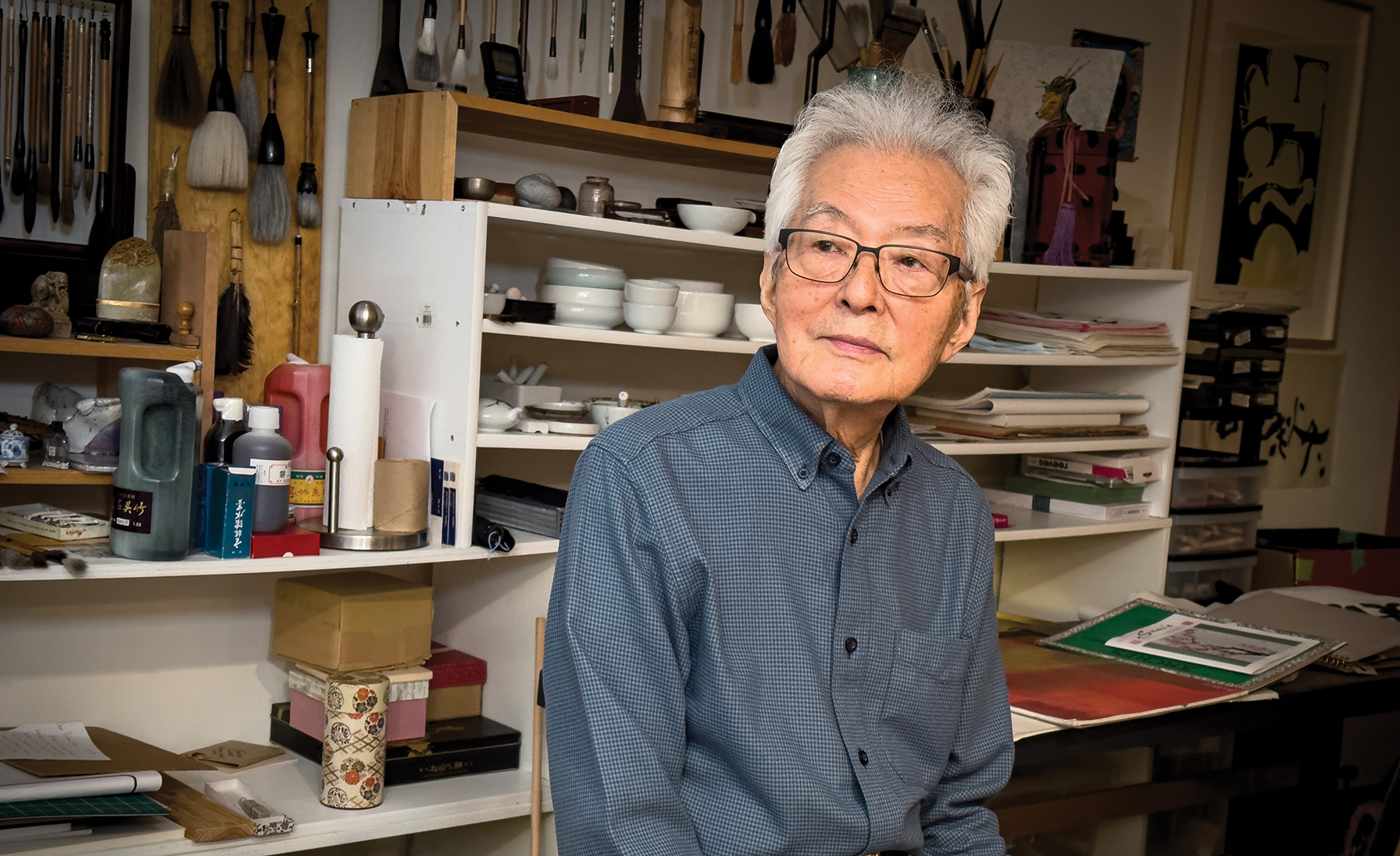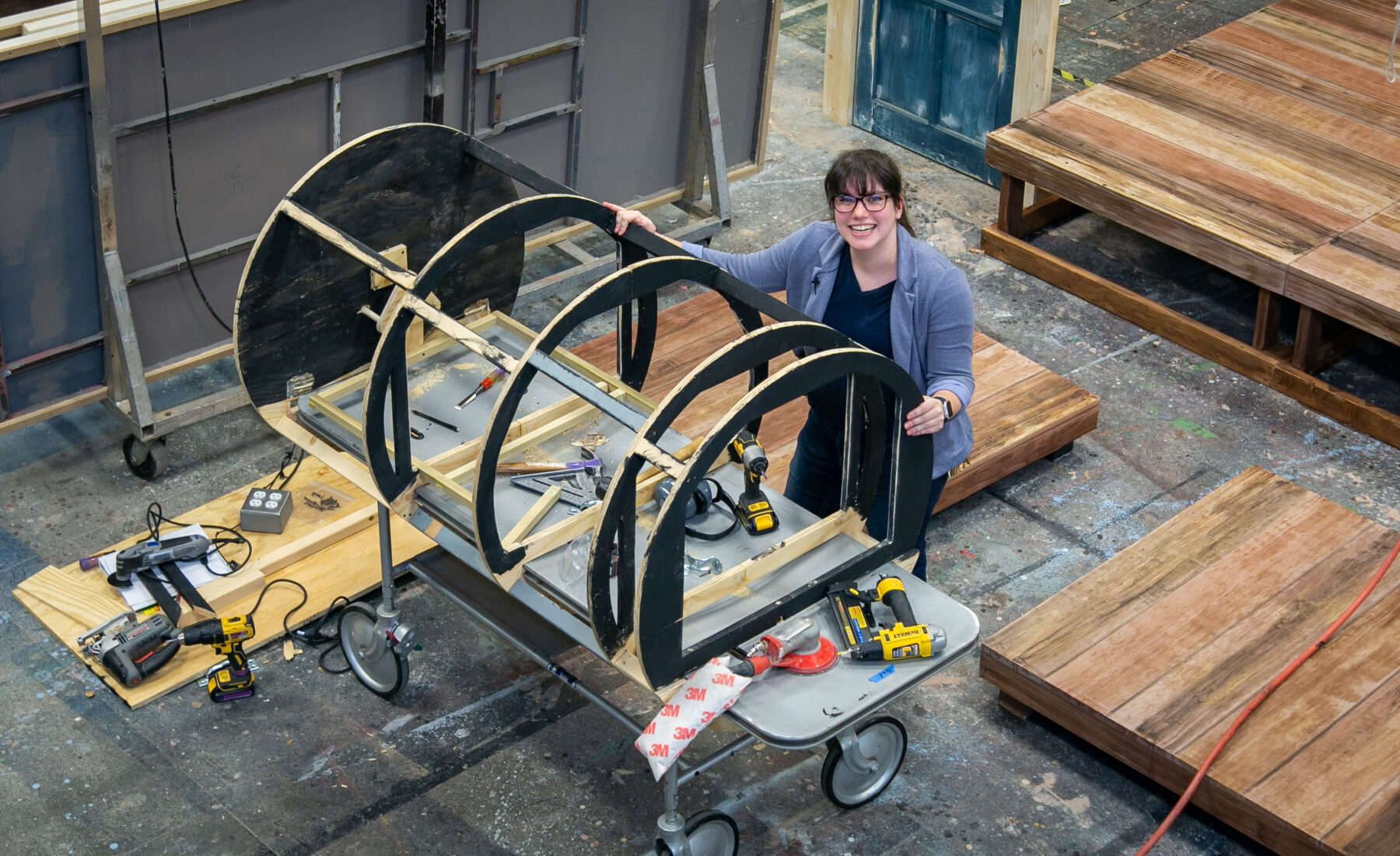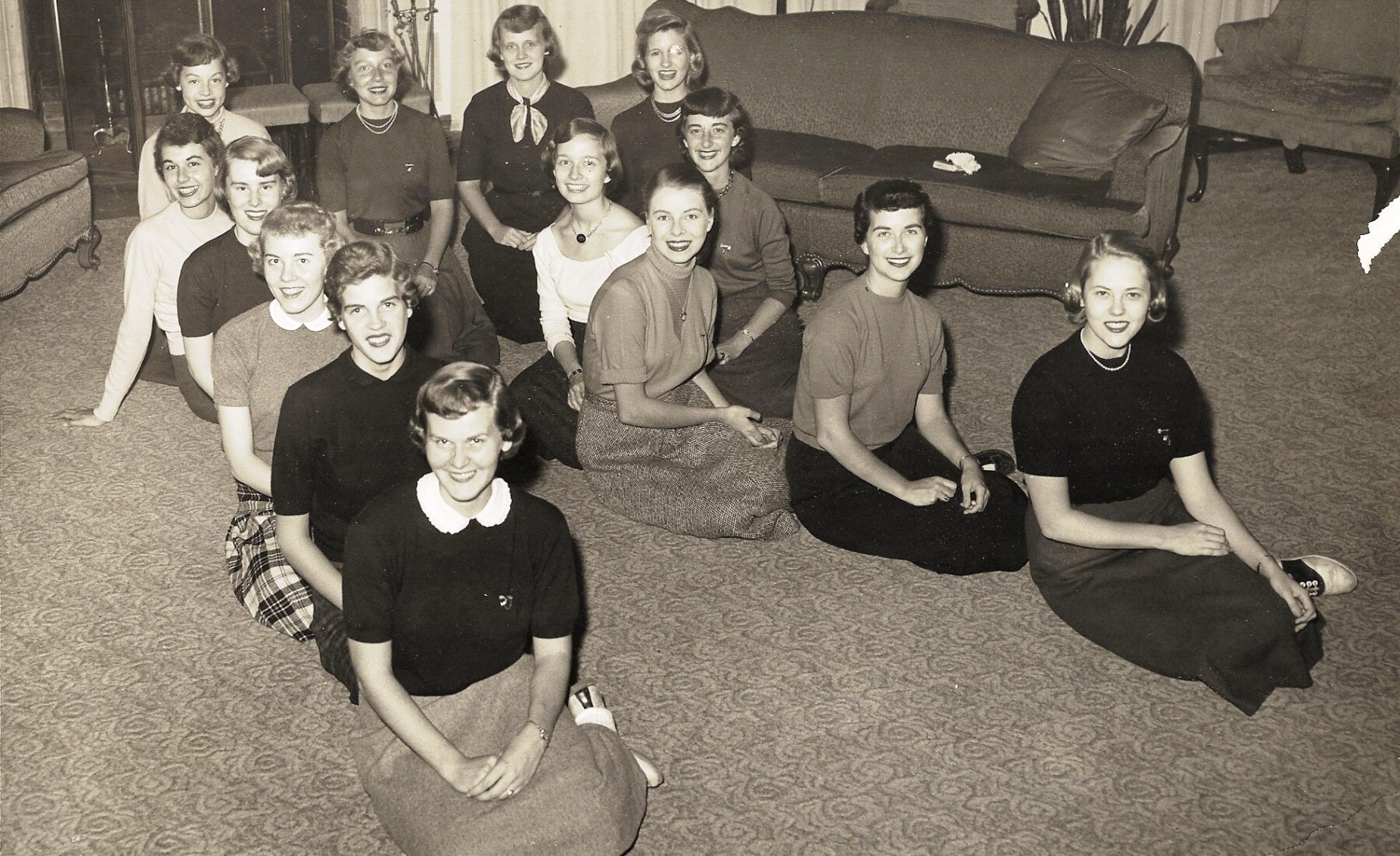The entertainment business, on both stage and screen, is unlike any other.
It’s one that prizes an actor’s moving performance of a first kiss or a sucker punch, passionate romantic encounter, or a bloody murder.
We have all watched these scenes, confident no one was actually hurt or traumatized, understandably ignorant to what the actors went through as they performed.
However, creating those scenes is more complicated than we know.
Actors create the illusion that these intimate scenes are really happening, when in reality, they are choreographed and directed. And, in the last few years, a new role has emerged: intimacy coordinator and director. The former correlates to film and the latter to stage. The purpose of which is to ensure the storytelling is effective, while making certain an actor’s participation in scenes of intimacy is safe and consensual. This new role provides long-needed attention to this issue, illustrated most recently by the unearthing of widespread abuse in the industry.

“We were starting to see how all of these power dynamics in the entertainment industry played into years and years of sexual harassment,” said Jessica Steinrock, CEO of Intimacy Directors & Coordinators (IDC), an organization that advocates for and educates about this new role and best practices for scenes involving intimacy. Jessica is best known for her work on Hulu’s “Little Fires Everywhere” and TNT’s “Animal Kingdom.”
Jessica leads this group holding close her own experience performing improv in Chicago while an undergrad at Illinois. She loved the spontaneity and making people laugh. There were times, though, that the settings were far from comfortable.
“I had some negative experiences that really led me to start questioning, what does it mean to have consent in improvised comedy setting? And so that became the question in my master’s program here at the University of Illinois,” Jessica recalled. “But for me, specifically, I felt like my gender was being weaponized against me in a lot of spaces. I felt like I had to be up for anything in order to make it in this industry.”
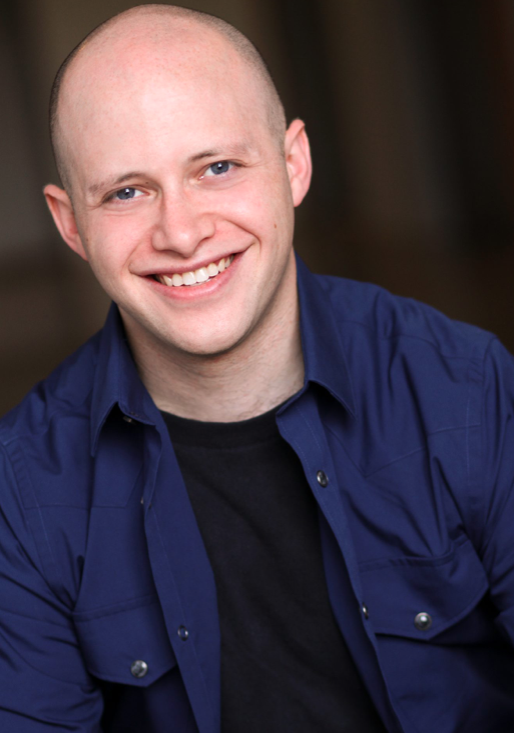
That experience led her to pursue intimacy coordination and directing, which is where she met her now husband, Zev Steinrock. His background is in fight direction, a discipline that also draws on illusion, and which is also undergoing fundamental changes. Zev is an award-winning fight director and has worked all over the country, most recently teaching at the Stella Adler Academy of Acting in Los Angeles, along with choreographing intimacy for the South Coast Repertory Theatre.
“Studies as recently as 2015 show that one in four women experience sexual assault on campus. And when we think about that in relation to theater, this means that a significant number of the actors who are performing these fight scenes have experienced some kind of sexual or domestic violence in their life. The assumption has been that if the actor is uncomfortable, they will say something, but this assumes the actors feel supported enough to say something,” Zev said. “Training actors how to recognize when their boundaries are being crossed and training teachers and fight directors to recognize those reactions owes a lot to the intimacy movement.”
Jessica, who completed her PhD in December 2020, and Zev, an assistant professor of acting, sat down with STORIED to share their journey as both pioneers and advocates of this revolutionary approach to choreographing an illusion.
Can you each tell me about the role you specialize in?
ZEV: Stage combat is the craft of telling a story of violence without anyone actually getting hurt. It’s the creation of the illusion of danger on stage, and that involves hand-to-hand techniques, working with weapons like knives, etc. It also involves sword works like in classical Shakespeare theatre companies. You can’t do Hamlet without stage combat—the climax just doesn’t happen without the sword fight. It’s an essential skill for actors.
As a fight director, I’m also involved in scenes where you’re not actually even thinking about the fact that it’s a fight, like falling. My role is part of anything that you consider a stunt. Actors study these disciplines, and a production and a fight choreographer comes in and helps the actors perform it safely, so that they can do it more than once!
This role is about protecting actors during scenes that involve heightened physical and emotional work, which is one of the reasons it often intersects with my work in intimacy.
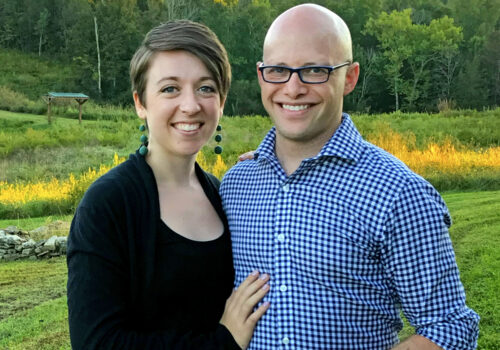
JESSICA: An intimacy director is an actor advocate and a movement director that specializes in telling scenes of intimacy safely and effectively. As intimacy directors, we’re thinking about their physical and emotional health, safety, and boundaries that support better storytelling and artistry. No one’s actually having sex.
Using choreography as a tool, I can check in about boundaries. We can talk about consent and where is okay and not okay to touch. We can say what kinds of touch we want and what kinds of movements are needed to tell the story.
Choreography allows us to be a lot more fluid and dynamic in our response to actor boundaries because there’s a specialist there who has experience in putting these scenes together.
The foundations of intimacy direction have been going on behind the scenes for a while, as many practitioners worked to develop ways to make the industry safer and more consensual. When #MeToo went viral in 2017, the intimacy direction and coordination movement exploded. Now with shows like “The Deuce” and “Bridgerton,” we’re getting a lot of media attention that has started a national and international conversation about this role.
It’s hard to believe roles like these didn’t already exist. How and when did they become an official part of a production?
JESSICA: There are many people who have and are currently contributing to this movement. Tonia Sina, in particular, whose background stemmed from fight choreography, is known as one of the first intimacy directors. Her work laid the foundation for the role as we know it today.
When it comes to intimacy coordination, Alicia Rodis, a long-time collaborator with Sina, adapted the work that they were doing for live performance and translated it for use in TV and Film. Her work on the tv show “The Deuce” gained national attention for its use of an intimacy coordinator, and HBO made a commitment to using intimacy coordinators from then on. The work of these two women has inspired numerous practitioners to help contribute and shape this role and this movement.
ZEV: The Society of American Fight Directors was created back in the 1970s, but generally speaking, fight directors have not been specifically trained to incorporate consent or emotional fitness and mental health in the way that these scenes are made.
It’s worth noting that in the past, many directors told actors to “just do it” regarding scenes of intimacy. Or, if those scenes were choreographed, they were choreographed by a fight director because the fight directors had the closest experience in creating physical simulations of an event.
Intimacy directors, however, are specialists in choreographing simulated sex and intimate moments, and are also highly trained in facilitating consent, navigating power structures, conflict resolution, as well as assessing mental health and trauma.
I have been working for two years professionally in the intimacy world. That work is very much informing the work I’m doing in stage combat. I am trying to move considerations of mental health and consent into fight direction because it is critical to performing scenes in a healthy way.
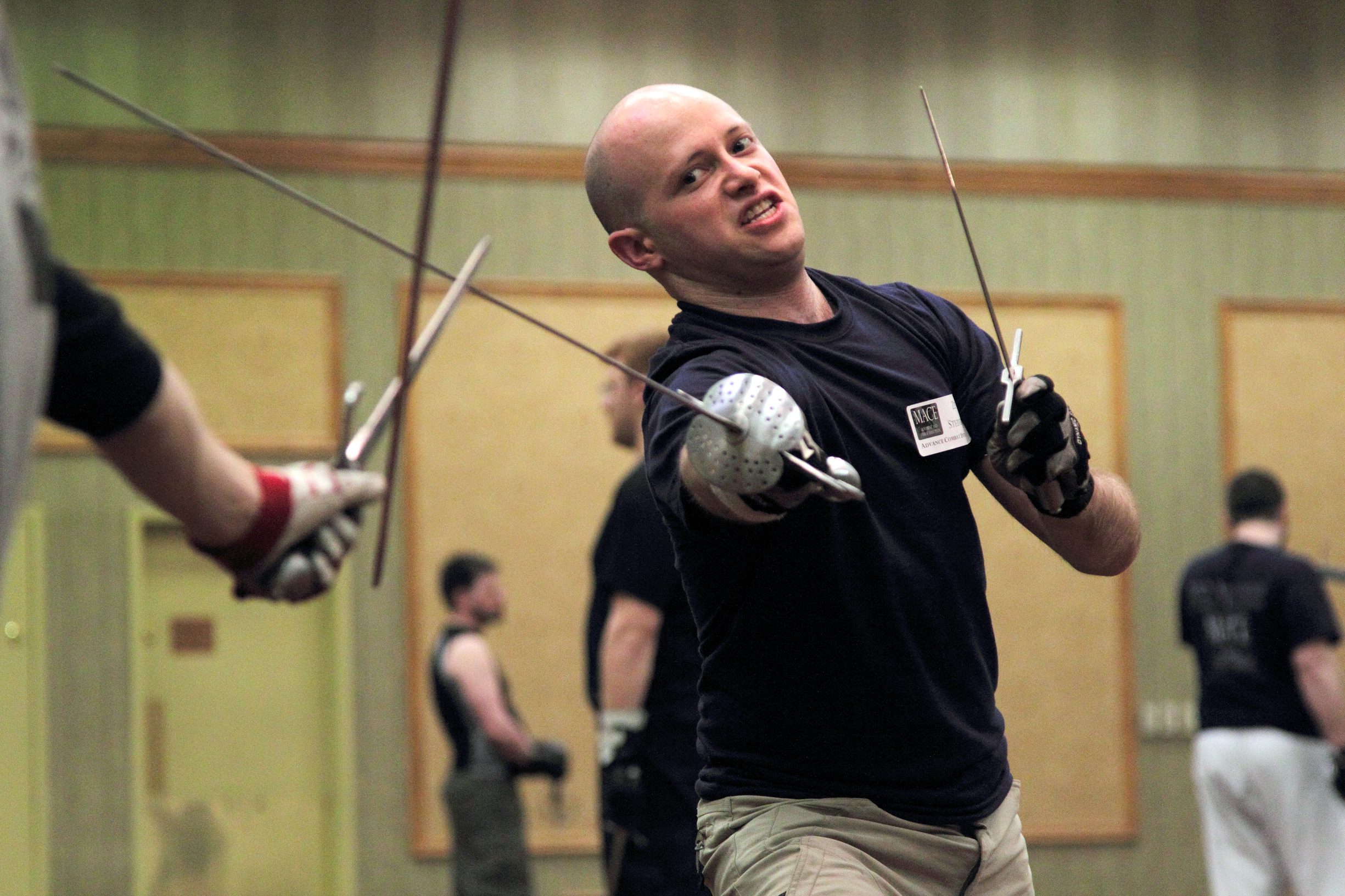
How did you get started in doing this work?
JESSICA: I met Tonia Sina in 2015 at a stage combat workshop in Chicago. We had this amazing conversation where I discovered we were asking similar questions about intimacy and consent in performance. Through that connection with Tonia, I met Alicia Rodis and some other incredible colleagues who have since become collaborators and business partners at IDC.
ZEV: I was working on a show in 2016 at the university called “In the Blood” by Suzan-Lori Parks, and I was called in to choreograph an oral sex scene because clearly, we didn’t need to actually do that. The director wanted to make the audience uncomfortable, and kind of put it right up in front of them, rather than allude to it. And so, we figured out how, using costumes and body movements, to block parts of the view, to make it look like it was really happening.
What goes into working with actors in these spaces?
JESSICA: Simulated sex is a hard thing to talk about because our culture just doesn’t want to talk about sex in general. There’s a lot of shame tied to human sexuality. Even on set, it’s really difficult for people to talk about it.
There’s absolutely a desensitization process for anyone who deals with human intimacy on stage or screen. There’s the need to remove the shame so that we can talk with actors openly and honestly, and really ask, “Okay, what are the risks here? What are your boundaries? Let’s talk through this to make sure that we’re telling the story that we actually want to tell.” My goal is always to be a facilitator of these conversations and make sure the actors have what they need to do their work as best they can
ZEV: The way stage combat has always been taught is with a safety-first mentality that is about creating the illusion of danger for the purpose of storytelling; that the character is in danger, but the actor is not. And that the acting is believable enough to the audience that they can engage in the story, but also not so hyper-realistic that they’re afraid for the actor. That has always been at the core of stage combat.
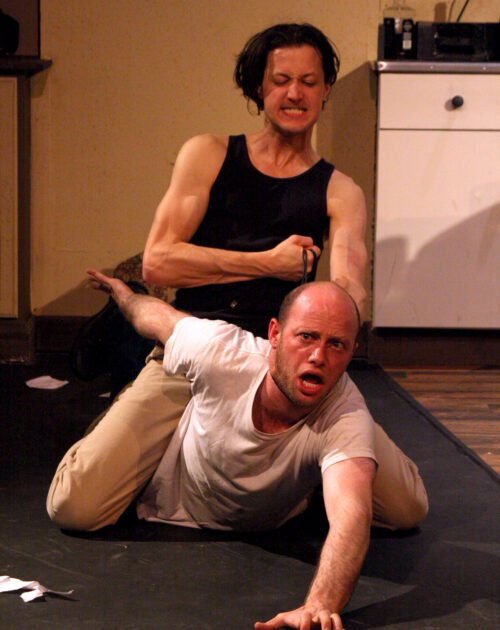
The intimacy direction movement is having great effects on actor training in general, but specifically with stage combat. The focus on physical safety has always been there. Still, when it comes to the moment to engage in the storytelling, like simulated strangulation, once their partner is like looking them in the eyes and acting in that moment, that can be an extremely disturbing experience, especially if the actors have some real history of violence in their life.
It’s creating the illusion that you think you see something that’s not actually happening right in front of you. Nobody is actually making contact with the other person. It’s a sleight-of-hand magic trick. It relies on a lot of angling and masking, meaning I’m blocking a certain part from the audience’s view by layering things that make sense to be there.
We repeat these performances live over and over again in front of an audience seven or eight times a week, for possibly several months. So, physical safety is paramount, and if we cannot do a scene safely, we shouldn’t do it period.
What is different now, though, is a recognition of traumatic stress or mental health as a key part of sustainable acting practice and training. These ideas of emotional fitness that have been brought to light through intimacy direction are not unique to intimacy direction. They apply to any kind of high-stakes or emotionally charged content work.
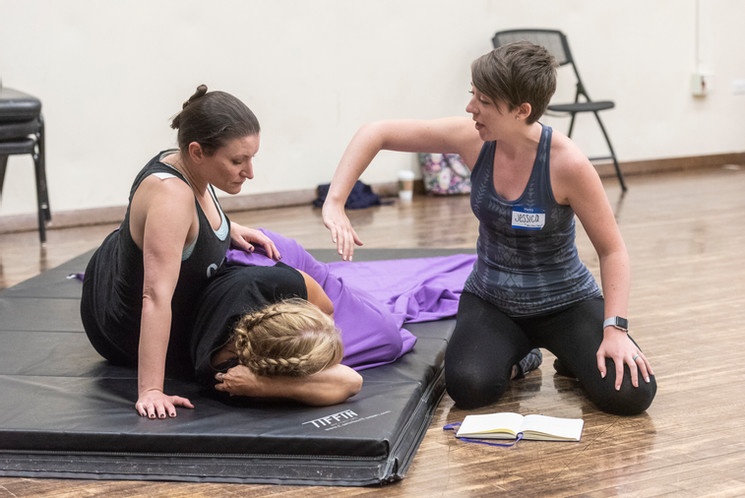
What do you think the industry and your roles are going to look like in 30 years?
ZEV: I’m really interested in the way you phrased the question of like, what would it look like? I kind of see it in the same way as unionizing or establishing OSHA rules about safety that make a safer work environment so that no employee is physically injured. I think we will eventually have that same feeling of like, no, actors should not be traumatized by participating in the industry, and it would be shocking to imply otherwise.
JESSICA: I talk a lot about the phrase “yes means nothing unless no is an option.” I think that’s really important to understand. I’m hoping thirty years from now, “no” is valued as a productive option.
Some of our best ideas were built starting from a place of no. When our first idea isn’t our best idea, saying no allows us to be more creative. I’m hoping that we see more growth and positive development coming from integrating consent, and we look back and we say, wow, we missed out on some amazing art by not accepting the word “no” as an answer.
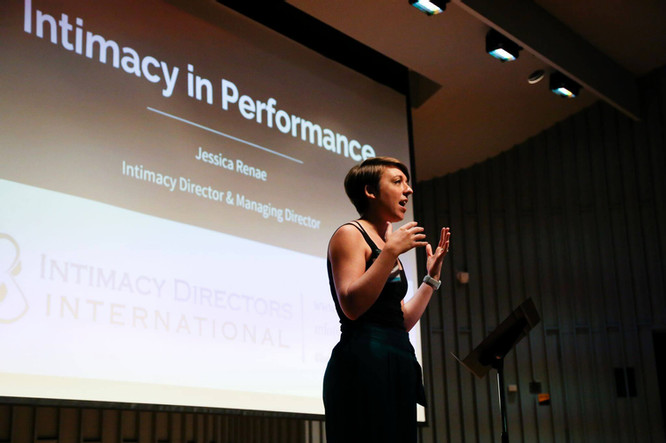
How is your work affecting the current generation of actors and those involved in the entertainment industry?
JESSICA: It is amazing to see the ferocity with which current students are clamoring for this material—for a vocabulary about their own body autonomy; for their own agency; to get consent from one another. When I am doing student workshops at universities, they’re so excited to be asked what they want. And when they’re asked what they want, they produce better results. They’re more excited and engaged. They’re willing to take risks in their own personal development and growth because they understand why those risks are being asked of them. And they get to feel like they are partners in their own education.
Undergraduate actors who are going to go into the professional industry are much more prepared and self-aware of what they want to do and what they don’t want to do.
ZEV: What Jessica said about the current student population is dead on. They are so eager to have an impact on the industry in this way.
JESSICA: We see young actors advocating for their own boundaries, and to think about what that means for the next generation of storytellers is really exciting for us.
This story was published .